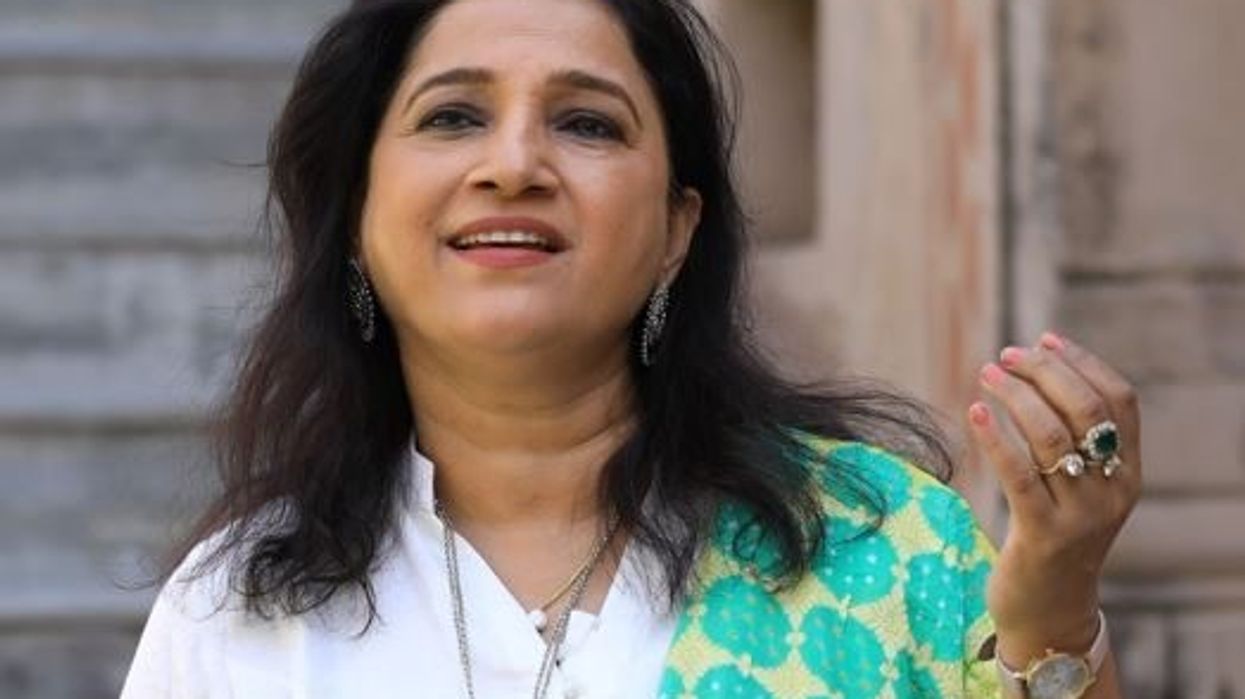WHETHER it is singing blockbuster Bollywood songs, composing, releasing awesome albums, or delivering mesmerising live ghazal and Sufi performances, Kavita Seth has done most things in music marvellously well.
Instead of basking in the glory of her many impressive achievements, the music talent continues to offer new listening experiences and has done that with her recently released album Dayaar-e-Rooh. The nine track masterpiece, recorded completely live, showcases her beautiful singing and composing abilities. The songs delving into themes of spirituality and connection to the divine have messages of love, compassion, and hope.
Eastern Eye caught up with the multi-talented maestro to discuss her new album, music, inspirations, and ability to generate emotion.
You have achieved so much, yet keep delivering great music, what keeps that motivation and passion alive?
It doesn’t matter how much you achieve in life, the hunger to better oneself is the only way forward. This zeal is my motivation. There are moments I am happy with my work and do notice a scope for improvement at times too. The passion and fire within keep this journey interesting and extremely fulfilling.
Tell us about your new album?
I release one song from my recent album every week. The album is called Dayaar-e-Rooh, which means the world of the souls. I have explored how poets give life to songs, ghazals and nazms, which is reflected in the songs. Sant Kabir’s dohe (couplets) composed by Kumar Gandharva also find a place in the album. It holds a very special place in my heart. On the whole, I feel like this album is a bouquet of flowers.
What was the thought process behind recording it live with musicians?
I wanted to give the album a certain touch that could only be experienced through live music. I didn’t want it to sound like a recorded piece. When we sing live, sometimes I go into a trance and the musicians also extend certain pieces and don’t stick to the set pattern. I wanted to make sure my listeners felt like they were listening to a concert. I wanted to retain a free-flowing quality in the songs. Before working on this album, we had recorded ghazals for Mira Nair’s A Suitable Boy in the same way. The idea was to keep it real and natural.
Which of your songs is closest to your heart?
A mother can never really pick favourites, isn’t it? Also, as an artist, I find it very difficult to choose one. The nine songs I have chosen as part of Dayaar-e-Rooh, including nazms, ghazals and songs, are all beautiful in their own right. They have their own beauty. Main jiska zikr karti hoon, woh meri fikr karta hai and Uski awaaz aise aati hai are some songs which I personally love. However, an artist creates for people, and I believe that good music always finds its listeners.
How much do great lyrics help you as a singer?
I am an old-school composer. I read the lyrics first and then if they inspire me, the tune automatically flows in. In this album there is a nazm by Shamim Zehra ji who used to share her poetry during Covid lockdown. Her words struck a chord with me, and I composed the tune without much ado. The lyrics inspire me to compose the tunes.
Who are you hoping connects with these songs?
I wanted to create an album with musicians who are playing live, and it’s recorded live. I’m hoping people who enjoy listening to good poetry set to tunes, will like it. A good song finds its audience. I never expected Rangi Sari to become so popular, but it did. I believe it’s destiny. I sing my songs and then leave it to my audience.
Which song on the album challenged you most as a singer?
They were my own compositions, which is why it wasn’t difficult. Sunta Hai Gurugyani, which is Kumar Gandharv ji’s composition, was challenging because it’s a cover version. The comparisons are inevitable. But I didn’t let that affect me.
How do you generate so much feeling in your voice?
It’s god’s gift. His grace. I understand the lyrics and then sing. I try to convey the thoughts and feelings of the poet or lyricist. That’s always been my goal.
Do you have any unfulfilled musical ambitions?
My journey has just started. I want to achieve so much more, and the sky is the limit. My desire and dream are to perform in some of the best concert halls in the world. The idea is to also heal people with my music. I want to sing songs which have a soul. I wish to take my music to different corners of the world, perform music live and connect with people from across the globe.
A lot of people enjoy listening to your beautiful voice, but what music do you like listening to?
I listen to all kinds of music. Earlier I used to only listen to classical renditions, ghazals or qawwalis. I still love those genres.
Ragas and instruments also have a special place in my heart. Nusrat Fateh Ali Khan, Abida Parveen, Jagjit Singh, Madan Mohan are some of the artists I love.
I also listen to world music. Music that touches your soul is what I like the most.
Today what inspires you as an artist?
My passion to do good work inspires me. It takes me forward in my journey to create better. It is a lifelong process.
If you could master something new in music, what would it be?
GenZ listens to rap and that’s something I can’t sing. I would like to try singing that. I am always open to exploring, learning, and enjoying music.
Why should we pick up the new album?
It’s a collection of poetry set to tune. The lyrics are meaningful, and the listening experience is like that of a live concert. I hope people will like it, as I have done my best.




